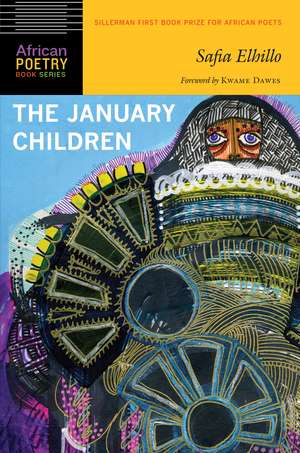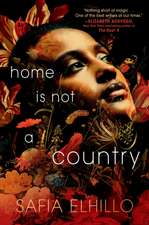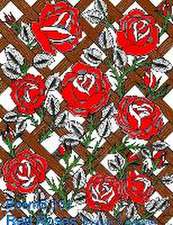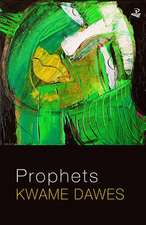The January Children: African Poetry Book
Autor Safia Elhillo Cuvânt înainte de Kwame Dawesen Limba Engleză Paperback – mar 2017
2018 Arab American Book Award Winner, Poetry
"A taut debut collection of heartfelt poems."—Publishers Weekly
In her dedication Safia Elhillo writes, “The January Children are the generation born in Sudan under British occupation, where children were assigned birth years by height, all given the birth date January 1.” What follows is a deeply personal collection of poems that describe the experience of navigating the postcolonial world as a stranger in one’s own land.
The January Children depicts displacement and longing while also questioning accepted truths about geography, history, nationhood, and home. The poems mythologize family histories until they break open, using them to explore aspects of Sudan’s history of colonial occupation, dictatorship, and diaspora. Several of the poems speak to the late Egyptian singer Abdelhalim Hafez, who addressed many of his songs to the asmarani—an Arabic term of endearment for a brown-skinned or dark-skinned person. Elhillo explores Arabness and Africanness and the tensions generated by a hyphenated identity in those two worlds.
No longer content to accept manmade borders, Elhillo navigates a new and reimagined world. Maintaining a sense of wonder in multiple landscapes and mindscapes of perpetually shifting values, she leads the reader through a postcolonial narrative that is equally terrifying and tender, melancholy and defiant.
Din seria African Poetry Book
-
 Preț: 83.06 lei
Preț: 83.06 lei -
 Preț: 106.18 lei
Preț: 106.18 lei -
 Preț: 83.30 lei
Preț: 83.30 lei -
 Preț: 84.53 lei
Preț: 84.53 lei -
 Preț: 82.48 lei
Preț: 82.48 lei -
 Preț: 113.19 lei
Preț: 113.19 lei -
 Preț: 83.71 lei
Preț: 83.71 lei -
 Preț: 80.79 lei
Preț: 80.79 lei -
 Preț: 81.85 lei
Preț: 81.85 lei -
 Preț: 114.86 lei
Preț: 114.86 lei -
 Preț: 76.28 lei
Preț: 76.28 lei -
 Preț: 91.33 lei
Preț: 91.33 lei -
 Preț: 92.14 lei
Preț: 92.14 lei -
 Preț: 91.96 lei
Preț: 91.96 lei -
 Preț: 91.55 lei
Preț: 91.55 lei -
 Preț: 107.22 lei
Preț: 107.22 lei -
 Preț: 90.69 lei
Preț: 90.69 lei -
 Preț: 95.24 lei
Preț: 95.24 lei -
 Preț: 90.69 lei
Preț: 90.69 lei -
 Preț: 103.31 lei
Preț: 103.31 lei -
 Preț: 92.55 lei
Preț: 92.55 lei -
 Preț: 91.55 lei
Preț: 91.55 lei -
 Preț: 138.36 lei
Preț: 138.36 lei -
 Preț: 91.96 lei
Preț: 91.96 lei -
 Preț: 92.55 lei
Preț: 92.55 lei -
 Preț: 92.37 lei
Preț: 92.37 lei -
 Preț: 124.34 lei
Preț: 124.34 lei -
 Preț: 104.73 lei
Preț: 104.73 lei -
 Preț: 89.69 lei
Preț: 89.69 lei -
 Preț: 90.51 lei
Preț: 90.51 lei -
 Preț: 91.33 lei
Preț: 91.33 lei -
 Preț: 92.37 lei
Preț: 92.37 lei
Preț: 81.85 lei
Nou
Puncte Express: 123
Preț estimativ în valută:
15.66€ • 16.75$ • 13.06£
15.66€ • 16.75$ • 13.06£
Carte disponibilă
Livrare economică 27 martie-10 aprilie
Livrare express 13-19 martie pentru 34.14 lei
Preluare comenzi: 021 569.72.76
Specificații
ISBN-13: 9780803295988
ISBN-10: 0803295987
Pagini: 90
Dimensiuni: 152 x 229 x 9 mm
Greutate: 0.14 kg
Editura: Nebraska
Colecția University of Nebraska Press
Seria African Poetry Book
Locul publicării:United States
ISBN-10: 0803295987
Pagini: 90
Dimensiuni: 152 x 229 x 9 mm
Greutate: 0.14 kg
Editura: Nebraska
Colecția University of Nebraska Press
Seria African Poetry Book
Locul publicării:United States
Notă biografică
Safia Elhillo is a Cave Canem fellow and poetry editor at Kinfolks Quarterly. Her work has appeared in several journals and anthologies including The BreakBeat Poets: New American Poetry in the Age of Hip-Hop. She is the author of The Life and Times of Susie Knuckles.
Cuprins
Foreword by Kwame Dawes
Acknowledgments
asmarani makes prayer
vocabulary
Sudan Today. Nairobi: University of Africa, 1971. Print.
to make use of water
[did our mothers invent loneliness or . . . ]
while being escorted from the abdelhalim hafez concert
application for the position of abdelhalim hafez’s girl
abdelhalim hafez asks for references
talking with an accent about home
origin stories
a brief history of silence
the last time marvin gaye was heard in the sudan
first interview for the position of abdelhalim hafez’s girl
the lovers
talking with an accent about home
first adornment
callback interview for the position of abdelhalim hafez’s girl
bride price
old wives’ tales
date night with abdelhalim hafez
first quarantine with abdelhalim hafez
self-portrait with dirty hair
watching arab idol with abdelhalim hafez
self-portrait with the question of race
second date
abdelhalim hafez wants to see other people
red moon night
self-portrait with yellow dress
others
alternate ending
[& what is a country but the drawing . . . .]
late-night phone call with abdelhalim hafez
republic of the sudan / ministry of interior / passport & immigration general directorate / alien from sudanese origin passcard
talking with an accent about home
talking with an accent about home (second take)
second quarantine with abdelhalim hafez
portrait with asylum
talking to boys about abdelhalim hafez at parties
biopic containing lies about abdelhalim hafez
asmarani does psychogeography
why abdelhalim
self-portrait with lake nasser
abdelhalim hafez asks who the sudanese are
the part i keep forgetting
talking with an accent about home (reprise)
third quarantine with abdelhalim hafez
final interview for the position of abdelhalim hafez’s girl
self-portrait as abdelhalim hafez’s girl
portrait with abdelhalim hafez with the question of race
lovers’ quarrel with abdelhalim hafez
portrait of abdelhalim hafez as orpheus
glossary
everything i know about abdelhalim hafez
notes
Acknowledgments
asmarani makes prayer
vocabulary
Sudan Today. Nairobi: University of Africa, 1971. Print.
to make use of water
[did our mothers invent loneliness or . . . ]
while being escorted from the abdelhalim hafez concert
application for the position of abdelhalim hafez’s girl
abdelhalim hafez asks for references
talking with an accent about home
origin stories
a brief history of silence
the last time marvin gaye was heard in the sudan
first interview for the position of abdelhalim hafez’s girl
the lovers
talking with an accent about home
first adornment
callback interview for the position of abdelhalim hafez’s girl
bride price
old wives’ tales
date night with abdelhalim hafez
first quarantine with abdelhalim hafez
self-portrait with dirty hair
watching arab idol with abdelhalim hafez
self-portrait with the question of race
second date
abdelhalim hafez wants to see other people
red moon night
self-portrait with yellow dress
others
alternate ending
[& what is a country but the drawing . . . .]
late-night phone call with abdelhalim hafez
republic of the sudan / ministry of interior / passport & immigration general directorate / alien from sudanese origin passcard
talking with an accent about home
talking with an accent about home (second take)
second quarantine with abdelhalim hafez
portrait with asylum
talking to boys about abdelhalim hafez at parties
biopic containing lies about abdelhalim hafez
asmarani does psychogeography
why abdelhalim
self-portrait with lake nasser
abdelhalim hafez asks who the sudanese are
the part i keep forgetting
talking with an accent about home (reprise)
third quarantine with abdelhalim hafez
final interview for the position of abdelhalim hafez’s girl
self-portrait as abdelhalim hafez’s girl
portrait with abdelhalim hafez with the question of race
lovers’ quarrel with abdelhalim hafez
portrait of abdelhalim hafez as orpheus
glossary
everything i know about abdelhalim hafez
notes
Recenzii
“A taut debut collection of heartfelt poems that speak to people who can claim multiple cultural identities, and whose identities reflect multiple geographies. The book is both personal and political, a love letter to Sudan and a memoriam for ghosts of happiness past.”—Publishers Weekly
“Elhillo is a mesmerizing performer at slams and has garnered tens of thousands of views on YouTube, but her poems work equally well on the page. And they speak not only to people of color or African émigrés but to those of complicated heritage form anywhere in the world, strangers in strange lands, strangers even in their own lands, in their own skins.”—Alex M. Frankel, Antioch Review
“In its best moments–and there are many—and across poems, one feels the plummet of alienation that comes from partial belonging, and therefore, from not really belonging at all. . . . Throughout the book, Elhillo matches the formal choices of individual poems with a compelling voice. In unpunctuated lines with extra internal spaces that mark pauses, drags, and absences, Elhillo’s language tumbles and accumulates; it points and then emphatically points again; it betrays a relentless awareness of audience, and thereby reveals at least one psychological reality of betweenness. . . . And it is Elhillo’s consistent reaching across gaps—like Whitman’s soul ‘[c]easelessly musing, venturing, throwing, seeking the spheres to connect them’—that is most moving of all. Despite the omnipresence of the Sudanese Diaspora, the movement of the book is from absence to presence . . . . The book, in the end, is shot through with a faith in human communion despite immense communal and individual loss.”—David Thacker, The Rumpus
“Elhillo is a mesmerizing performer at slams and has garnered tens of thousands of views on YouTube, but her poems work equally well on the page. And they speak not only to people of color or African émigrés but to those of complicated heritage form anywhere in the world, strangers in strange lands, strangers even in their own lands, in their own skins.”—Alex M. Frankel, Antioch Review
“In its best moments–and there are many—and across poems, one feels the plummet of alienation that comes from partial belonging, and therefore, from not really belonging at all. . . . Throughout the book, Elhillo matches the formal choices of individual poems with a compelling voice. In unpunctuated lines with extra internal spaces that mark pauses, drags, and absences, Elhillo’s language tumbles and accumulates; it points and then emphatically points again; it betrays a relentless awareness of audience, and thereby reveals at least one psychological reality of betweenness. . . . And it is Elhillo’s consistent reaching across gaps—like Whitman’s soul ‘[c]easelessly musing, venturing, throwing, seeking the spheres to connect them’—that is most moving of all. Despite the omnipresence of the Sudanese Diaspora, the movement of the book is from absence to presence . . . . The book, in the end, is shot through with a faith in human communion despite immense communal and individual loss.”—David Thacker, The Rumpus
“The first sound of what will be a remarkable noise in African poetry. Safia Elhillo has already laid out in this collection a complex foundation for a rich and complex body of work. What is unmistakable is her authority as a poet—she writes with great control and economy, but also with a vulnerability that is deeply engaging. Above all, her poems are filled with delight—a quality of humor that is never trite but always honest and insightful.”—from the foreword by Kwame Dawes
"Safia Elhillo's triumph is not that she sings about novel love and heartbreak, but that she does so in an unforgettable voice."—Irene Mathieu, Muzzle
"Safia Elhillo’s The January Children offers the reader a galaxy of Sudanese voices engaging individual and collective memory in a manner that not only introduces readers to the nuances that animate that ancient land of layered diversity, which lends this collection a collage-like quality that is as sublime in its coherence as it is revelatory in its execution."—Post No Ills Magazine








